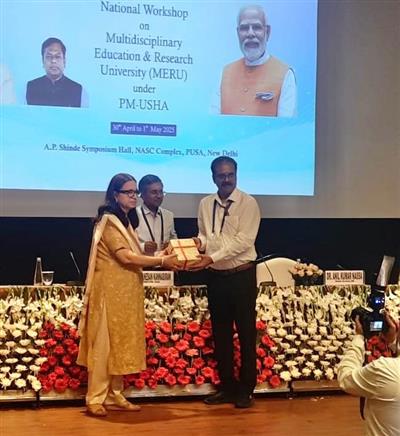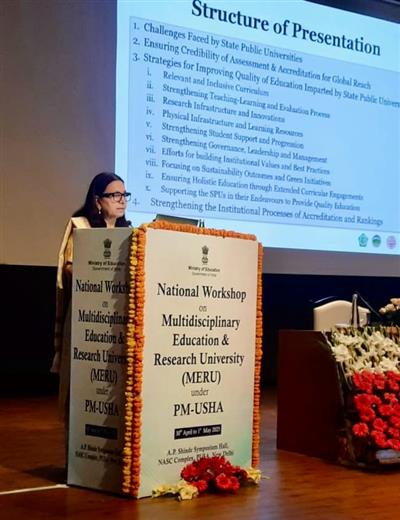

Prof. Renu Vig, Vice Chancellor of Panjab University presented a strategic 10-point plan to uplift the standards of State Public Universities (SPUs), offering a practical roadmap to reshape the future of higher education in India.
Ptof Vig made the presentation at the two-day National Workshop on Multi-Disciplinary Education and Research Universities (MERU) organised by Ministry of Education, Government of India on May 1, 2025.
The Ministry of Education had invited vice chancellors from 64 state universities, along with State Project Directors from RUSA 2.0, to work together on draft papers covering twelve key themes. Panjab University led a consortium that included HP University Shimla, Guru Jambheshwar University of Science & Technology (Hisar), Gondwana University (Gadchiroli) and Kannur University, under the guidance of Sh Rubinderjit Singh Brar, Director of Higher Education, Chandigarh.
Union Minister of State for Education Dr. Sukanta Majumdar inaugurated the workshop at the Indian Council of Agricultural Research (ICAR) in New Delhi. Today’s valedictory session featured Union Education Minister Shri Dharmendra Pradhan, who praised the collaborative efforts of all participants.
Speaking on “Providing Quality Education: Accreditation and Ranking,” Prof. Vig argued that current accreditation systems focus too much on paperwork and must shift toward real measures of quality, innovation, and outcomes. She proposed making accreditation mandatory for every higher-education institution by 2030, aligning more closely with the National Education Policy (NEP) 2020 and international standards.
To tackle the uneven implementation of NEP reforms, Prof. Vig detailed her ten-point framework:
- Curriculum Reform – Design flexible, interdisciplinary courses that meet India’s needs and global trends.
- Research Infrastructure – Invest in labs, libraries and digital resources.
- Innovation Hubs – Build links between universities, industry, research bodies and start-ups.
- Digital Services – Set up centralized learning-management systems and automate administrative tasks.
- Leadership & Governance – Grant more autonomy, encourage participative decision-making, and develop strategic plans.
- Performance Monitoring – Use transparent metrics to track progress.
- Faculty Support – Offer welfare programs, training and leadership development for teachers.
- International Accreditation – Push universities to seek global quality marks.
- Global Collaborations – Promote joint projects and dual-degree programmes with overseas partners.
- Outcome Orientation – Focus on measurable improvements in student learning and research impact.
After Prof. Vig’s talk, a lively Q&A session drew questions from education leaders nationwide. The session was chaired by Prof. Anil Kumar Nassa, Member-Secretary of the National Board of Accreditation (NBA), and Prof. Ganesan Kannabiran, Director of the National Assessment and Accreditation Council (NAAC).
Dr. Anil Kumar Nassa explained NBA’s role in accrediting specific technical and management programmes based on nine graduate-attribute criteria. He also reviewed the evolution of the NIRF ranking exercise, which began in 2015 with three categories and now covers eleven. Key ranking parameters include enrolment & courses, teaching-learning, research & innovation, outreach & inclusivity, and peer perception—each weighted differently to reflect its importance.
Prof. Ganesan Kannabiran described how NAAC has sparked a nationwide quality movement in higher education, aiming for “Viksit Bharat 2047.” NAAC follows a “Light but Tight” accreditation model, offers mentorship to institutions in aspirational districts, and plans to introduce a Maturity-Based Graded Levels (MBGL) framework for global positioning. He also spoke about NAAC’s focus on social-responsibility initiatives and regional consultations with universities, industry and other stakeholders.
Among those in attendance were Dr. Vineet Joshi, Secretary of the Department of Higher Education; Shri Sunil Kumar Barnwal, Additional Secretary at the Ministry of Education; Prof. T G Sitharam, Chairman of AICTE; Prof. Anil Sahasrabudhe, Chairperson of NETF; Shri Armstrong Pame, Joint Secretary; former UGC Chairman Prof. M. Jagadesh Kumar; as well as vice chancellors, policymakers and academic experts.
Over the two days, participants also explored topics such as e-governance, UGC regulations, university clustering, holistic education with skill development, equity and access, teaching in local languages, research internationalisation, faculty development, the Indian knowledge system, and digital transformation. The workshop’s mix of strategy, discussion and collaboration is expected to pave the way for stronger, more innovative state universities in the years ahead.




